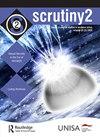科勒卡·普图玛和辛迪斯瓦·布苏库·马瑟诗歌中的知识与解放
IF 0.1
0 LITERATURE
Scrutiny2-Issues in English Studies in Southern Africa
Pub Date : 2018-01-02
DOI:10.1080/18125441.2018.1505937
引用次数: 1
摘要
摘要本文通过非殖民化的视角,解读了两位最近出版的南非诗人辛迪斯瓦·布苏库·马瑟和科莱卡·普图马的处女作。在两位诗人的作品中,读者都遇到了当代南非黑人女性主题,这些主题是在全球殖民主义的矩阵中构建的。这些作品阐述了身份和归属问题,许多南非年轻人无疑正在努力解决这些问题。两位诗人都在“遗忘”的过程中识别、质疑和抵制所谓的殖民主义领域,即权力的殖民主义、知识的殖民主义和存在的殖民主义。仔细阅读这两位诗人的主题和美学,可以发现,出现的演讲主题的发音位置位于两个或多个截然不同的知识框架之间的断层线上。本文章由计算机程序翻译,如有差异,请以英文原文为准。
Knowledge and Unlearning in the Poetry of Koleka Putuma and Sindiswa Busuku-Mathese
Abstract This paper provides a reading, through a decolonial lens, of the debut work of two recently published South African poets, Sindiswa Busuku-Mathese and Koleka Putuma. In the work of both poets, the reader encounters contemporary South African black womxn subjects, constructed in the matrix of global coloniality. The works articulate issues of identity and belonging, with which many young South Africans are undoubtedly grappling. Both poets identify, interrogate, and resist what might be termed the realms of coloniality—namely coloniality of power, coloniality of knowledge, and coloniality of being—in a process of “unlearning”. A close reading of the themes and aesthetics of these two poets suggests that the site of enunciation for the speaking subjects that emerge is located at the fault lines between two or more very divergent knowledge frameworks.
求助全文
通过发布文献求助,成功后即可免费获取论文全文。
去求助
来源期刊
CiteScore
0.50
自引率
0.00%
发文量
10
期刊介绍:
scrutiny2 is a double blind peer-reviewed journal that publishes original manuscripts on theoretical and practical concerns in English literary studies in southern Africa, particularly tertiary education. Uniquely southern African approaches to southern African concerns are sought, although manuscripts of a more general nature will be considered. The journal is aimed at an audience of specialists in English literary studies. While the dominant form of manuscripts published will be the scholarly article, the journal will also publish poetry, as well as other forms of writing such as the essay, review essay, conference report and polemical position piece. This journal is accredited with the South African Department of Higher Education and Training.

 求助内容:
求助内容: 应助结果提醒方式:
应助结果提醒方式:


